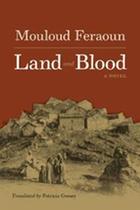
Mouloud Feraoun, a friend of Albert Camus, was murdered by right-wing paramilitary terrorists in 1962 during the last days of French colonial rule in Algeria. His 1953 novel, Land and Blood, takes place in the 1930s in the Algerian village of Ighil-Nezman, in a corner of Kabylia.
Amer is a prodigal son returning after 15 years to the village where he was born. With him is his beautiful wife, Marie, a poor Parisian starting a new life. The Kabyles are a poverty-stricken people; many of the men go to France to work in the coal mines, where Amer caused the death of his uncle in a mining accident. Marie is that uncle's suspected love-child. The man's brother is waiting for Amer in his home village, planning vengeance.
This ancient village is thick with secrets, and Feraoun reveals them one by one: wives who have covered for impotent husbands with secret lovers, husbands who have sidestepped infertile wives with convenient cousins, the land-swapping, the power alliances. The villagers are wary of a couple with no children. Amer and his French wife are childless; so are the dead man's brother and his young wife, Chabha. Four childless people, with an unresolved murder between them.
Feraoun lyrically reveals the intricacies of Kabylian life. Part anthropological re-creation of a lost way of life, part tragic love story of a village nearly ripped apart by ancient codes of honor and conflicting allegiances, Land and Blood is a dense, richly rewarding novel memorializing a little-known world in transition. --Nick DiMartino

